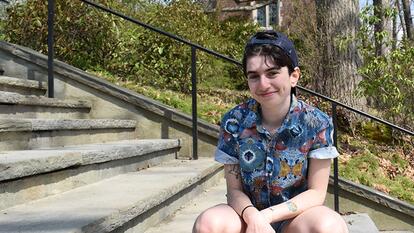Meet Kate Upatham, Wellesley’s New Title IX Coordinator

Kate Upatham, Wellesley’s new full-time director of nondiscrimination initiatives and Title IX coordinator/504 coordinator, talks about her time teaching in Zimbabwe with the U.S. Peace Corps; working for the U.S. Department of Education’s Office for Civil Rights; and how now, at Wellesley, she is looking forward to working with the community on long-term, integrated approaches to address discrimination based on protected categories including disability, race, color, national origin, and sex.
Q: How did you get into working in civil rights and with Title IX in higher education? What originally drew you to law school and to this field?
Kate Upatham: I have always been passionate about justice, improving the lives of others, and education. After teaching in the U.S. Peace Corps in Zimbabwe, I decided that a law degree would give me greater leverage to make the lives of others better. In law school, I was lucky to learn about the U.S. Department of Education’s Office for Civil Rights (OCR) while paging through a book of possible internships, and I immediately applied to work for that office. It was a wonderful internship, and it shaped the focus of my work from there on out.
After law school, I worked for two years as an employment lawyer before becoming a civil rights attorney with OCR in Boston. I spent eight years there working to eliminate discrimination based on disability, race, color, national origin, and sex. I am proud of the work I did there, but after eight years I decided that I wanted to work more closely with schools, so I joined a firm that helped schools comply with civil rights laws, including Title IX.
Q: What drew you to this role at Wellesley, working within the college itself?
Upatham: At my law firm, I was able to help students and communities in discrete ways that I valued, but I found that working outside an organization did not allow me to engage as deeply with campuses as I would have liked. I wanted to be a part of a more long-term, integrated approach to improving the experiences of a community. I am excited to bring my expertise in nondiscrimination to Wellesley, where I will have that long-term involvement that I wanted.
Q: In your first few weeks here, what excites you about the Wellesley community?
Upatham: I have felt so welcome here! I have been impressed with the kindness of everyone I have met on campus. I have always admired Wellesley for the top-notch education it provides and for its history of fighting discrimination by providing education to women when others would not. I am really excited to be a part of this excellent institution.
Q: What is one random fact about yourself that you would like to share?
Upatham: Most weekends, I can be found hiking in the Blue Hills. I find that getting into nature is one of the best ways to keep mentally and physically fit.
Q: What’s one thing you want students, faculty, and staff to know about your role here? About nondiscrimination initiatives and Title IX?
Upatham: A couple of things are important to me:
- My office is here to respond to concerns of discrimination or harassment based on any protected status (not just sex): race, religion, color, sex, age, ethnic or national origin or ancestry, veteran status, physical or mental disability, pregnancy, sexual orientation, gender identity or expression, genetic information, veteran or military status, membership in Uniformed Services, or any category protected by applicable state and federal laws.
- In general, when a person discloses concerns of discrimination, my office follows that person’s lead in deciding how the College will respond. Some people are afraid that disclosing concerns of discrimination means that a full investigation will be conducted, regardless of what they want. That is not the case. Sharing concerns with my office means that support and resources can be provided to someone who says they have experienced harassment or discrimination. An investigation usually will not happen unless the person who experienced the possible discrimination wants an investigation. The exception to following the lead of what a person wants is if there is a substantial risk of repeat offenses that could impact others in our community.
- I take privacy seriously and will only share information with individuals who need to know about the concerns raised so that Wellesley can appropriately respond. Health Services, the Stone Center, and the Office of Religious and Spiritual Life are confidential resources.
Contact Kate Upatham or the Title IX office through the online reporting form, by email at titleix@wellesley.edu, or by phone at 781-281-2451.



